Pas de biographie disponible.
Compositeur Musique additionelle Librettiste Parolier Metteur en scène Chorégraphe Producteur création Producteur version

Musical
Musique: Bert Kalmar • Harry Ruby • Paroles: Bert Kalmar • Harry Ruby • Livret: George S. Kaufman • Marc Connelly • Production originale: 3 versions mentionnées
Dispo:
A cause du livret de George S. Kaufman et Marc Connelly, Helen of Troy, New York a pris la forme fade habituelle du musical standard sur le thème de Cendrillon et y a ajouté une pincée de piquant.
Genèse:
Résumé:
Création: 19/6/193 - American Airlines Theatre (Broadway) - 191 représ.
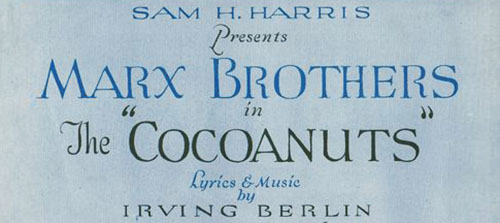
Musical
Musique: Irving Berlin • Paroles: Irving Berlin • Livret: George S. Kaufman • Morrie Ryskind • Production originale: 4 versions mentionnées
Dispo: Résumé Génèse Liste chansons
Genèse: The Cocoanuts was written for the Marx Brothers after the success of their hit Broadway revue I'll Say She Is (1924). The Cocoanuts is set against the backdrop of the 1920s Florida Land Boom des, which was followed by the inevitable bust. Groucho is a hotel proprietor, land impresario, and con man, assisted and hampered by two inept grifters, Chico and Harpo, and the ultra-rational hotel assistant, Zeppo. Groucho pursues a wealthy dowager ripe for a swindle, played by the dignified Margaret Dumont. Produced by Sam H. Harris, the musical was given a tryout in Boston on October 26, 1925, then Philadelphia. The Broadway run opened at the Lyric Theatre on December 8, 1925 and closed on August 7, 1926 after 276 performances. The production was directed by Oscar Eagle, with musical staging by Sammy Lee. After the Broadway closing, the brothers took the show on tour. On June 10, 1926, four new songs and other changes were introduced in the show. The new version, referred to as the "1926 Summer Edition", featured the Brox Sisters, who sang the songs originally assigned to the character of Penelope.[1] A brief Broadway revival played at the Century Theatre from May 16, 1927 to May 28, 1927 with the same creative team. The more famous film adaptation was released by Paramount Pictures in 1929, soon after the addition of synchronized sound permitted talking movies.
Résumé: Cocoanuts se déroule dans l'hôtel Cocoanut, un hôtel de villégiature, pendant le boom des terres en Floride des années 1920 . M. Hammer dirige l'endroit, assisté de Jamison, qui préfère dormir à la réception plutôt que de l'aider à le gérer. Chico et Harpo arrivent avec des bagages vides, qu'ils prévoient apparemment de remplir en volant et en escroquantles invités. Mme Potter est l'une des rares clientes payantes. Sa fille Polly est amoureuse du jeune architecte en difficulté Bob Adams mais cete relation est considérée comme totalement inadmissible par sa mère autoritaire. Il travaille pour subvenir à ses besoins en tant que commis à l'hôtel, mais a des plans pour le développement de toute la zone en tant que Cocoanut Manor. Mme Potter veut que sa fille épouse Harvey Yate, qu'elle croit être d'un statut social plus élevé que Bob Adams. Ce prétendant est en fait un escroc qui cherche à voler le collier de diamants de la douairière avec l'aide de son partenaire de connivence Penelope, mais ils ne sont pas les seuls à y penser. Quand le collier disparaît enfin, le vol est reproché au petit ami. Son innocence est finalement prouvée lorsque les vrais escrocs sont confondus, et les amants reçoivent la bénédiction maternelle.
Création: 8/12/1925 - Lyric Theatre (Broadway) - 276 représ.
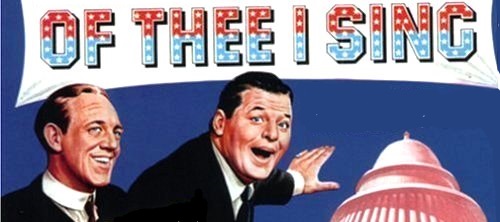
Musical
Musique: George Gershwin • Paroles: Ira Gershwin • Livret: George S. Kaufman • Morrie Ryskind • Production originale: 4 versions mentionnées
Dispo: Résumé Commentaire Génèse Liste chansons
Of Thee I Sing is a musical with a score by George Gershwin, lyrics by Ira Gershwin and a book by George S. Kaufman and Morrie Ryskind. The musical lampoons American politics; the story concerns John P. Wintergreen, who runs for President of the United States on the "love" platform. When he falls in love with the sensible Mary Turner instead of Diana Devereaux, the beautiful pageant winner selected for him, he gets into political hot water. The original Broadway production, directed by Kaufman, opened in 1931 and ran for 441 performances, gaining critical and box office success. It has been revived twice on Broadway and in concert stagings in the U.S. and in London. In 1932, Of Thee I Sing was the first musical to win the Pulitzer Prize for Drama.
Genèse: The Gershwins and George S. Kaufman had collaborated on a satirical musical in 1927 entitled Strike up the Band, which played in Philadelphia. The show concerned a cheese manufacturer who sponsors a war against Switzerland because it will be named after him. A version of Strike Up the Band, with the book altered by Morrie Ryskind, played on Broadway in early 1930. Much of the satire was replaced in the new version by silliness, leading Ryskind to recall, "What I had to do, in a sense, was to rewrite War and Peace for the Three Stooges." Later that year, Kaufman and Ryskind conceived a new musical focusing on satire about rival political parties battling over a new national anthem. The Gershwin brothers agreed to write the score, although they were scheduled to be in Hollywood writing songs for the film Delicious. Kaufman and Ryskind soon realized that their concept did not provide sufficient plot for a musical. They crafted a libretto inspired by the timeless battle of political idealism with corruption and incompetency, creating the first American musical with a consistently satiric tone. The writers and the cast were unsure of what the public's reception would be, prompting Kaufman's now-famous statement, "Satire is what closes on Saturday night." Productions The original Broadway production, directed by Kaufman, opened at the Music Box Theatre on December 26, 1931 and ran for 441 performances. The cast included William Gaxton as John P. Wintergreen, Lois Moran as Mary Turner, Grace Brinkley as Diana Devereaux, Victor Moore as Alexander Throttlebottom and George Murphy as Sam Jenkins. It was produced by Sam H. Harris. Sets were designed by Jo Mielziner, costumes by Carles LeMaire, and dances staged by Georgie Hale. It was Gaxton and Moore's first comedic pairing; they would collaborate on six more Broadway musicals, including Anything Goes. The orchestrations were by Robert Russell Bennett, William Daly (including the "Overture"), and Gershwin ("Hello, Good Morning"). Of Thee I Sing was the longest-running Gershwin show during George Gershwin's lifetime. There were Broadway revivals in 1933 at the Imperial Theatre and in 1952 at the Ziegfeld Theatre, both directed by Kaufman. A concert production of Of Thee I Sing was mounted by Ian Marshall Fisher's Lost Musicals series at the Barbican Centre in London in August 1996. Fisher's series examines the Gershwins' lesser known works (as well as others) and has been based at London's Royal Opera House and Sadler's Wells. The musical was presented in May 2006 as part of the New York City Center Encores! staged concert series. Directed by John Rando and choreographed by Randy Skinner, the cast starred Victor Garber as John P. Wintergreen, Jefferson Mays as Vice President, Alexander Throttlebottom, and Jennifer Laura Thompson as First Lady. The latest revival was in July 2015 at the Royal Festival Hall, London by producer Ollie Rosenblatt as a full musical with orchestra. Diana Devereaux was played by Hannah Waddingham, Wintergreen by Hadley Fraser and Throttlebottom by Tom Edden. The Royal Philharmonic Concert Orchestra provided the new musical setting for the piece. In September 2015 the Sqabbalogic theatre company and Sydney Philharmonia Choirs presented the musical in the Concert Hall, Sydney Opera House.
Résumé:
Acte I
In the U.S. in the 1930s, a campaign parade is taking place to support Wintergreen for President. John P. Wintergreen has been nominated for President and Alexander Throttlebottom has been nominated for Vice President, but he is of such little importance no one can remember who he is. Politicians meet in a hotel room to devise a campaign platform, and when they ask the chambermaid what she cares about, she first says "money," then "love" when pressed further. The men decide that Wintergreen's platform will be "love;" they'll have a pageant to select the most beautiful girl in the United States, and Wintergreen will fall in love and marry her. The pageant begins in Atlantic City, New Jersey, and the contestants wonder, Who is the Lucky Girl to Be? The photographers assure them that even if they do not win, they will surely be loved (The Dimple on My Knee). Wintergreen is getting nervous about marrying a girl he doesn't know. While the girls are at the final judging, he confides in Mary Turner, the sensible young woman running the pageant. He does not want to marry a girl just because she's beautiful; he wants a wife who will make a good home for him and his future children. Mary shares her corn muffin with him. Wintergreen tells Mary that he'd rather marry her than any of the girls in the contest. He kisses her, and she agrees to marry him. The judges of the pageant announce that Diana Devereaux, a beautiful southern girl, has won the contest, but Wintergreen declares that he loves Mary Turner. When he gives some of Mary's extraordinary corn muffins to the judges, they agree that John and Mary are meant to wed (Because, Because). Outside Madison Square Garden in New York City, at a rally for Wintergreen, the campaigners declare that Love is Sweeping the Country. Inside, where politicians are speaking in favor of Wintergreen, a wrestling match is going on just below the speakers' platform as Alexander Throttlebottom tries to explain to the organizers that he's the candidate for Vice-President. Wintergreen proposes to Mary onstage, as he has in forty-seven states before. She accepts again, and Wintergreen sings the campaign song to her, Of Thee I Sing. On election night, Wintergreen wins by a landslide. Inauguration day arrives, which is also Wintergreen's wedding day. As his inaugural address, Wintergreen bids goodbye to the girls he used to know (Here's a Kiss for Cinderella). The Chief Justice presides over the wedding ceremony, and just after he has pronounced John and Mary man and wife, Diana Devereaux interrupts the proceedings. She is serving Wintergreen with a summons for breach of promise. She insists she is the one he should have married (I Was the Most Beautiful Blossom). The Supreme Court rules that Mary's corn muffins are more important than justice in this matter, and Diana angrily leaves to tell her story across the nation. Wintergreen leads the Supreme Court and spectators in a chorus of Of Thee I Sing.Acte II
John and Mary settle down to business in the White House. Her "desk," back-to-back with his, is a fully loaded tea-table. Their secretaries greet each other "Hello, Good Morning." Alexander Throttlebottom, now Vice-President, sneaks into the White House with a tour group. When a guide tells him that the Vice-President's job is to preside over the U. S. Senate, Throttlebottom eagerly dashes off to the Capitol. Wintergreen's fellow party members inform him that Diana Devereaux is gaining support across the nation. Wintergreen holds a press conference and tells the reporters that his love for Mary is the only thing that matters (Who Cares?). The French ambassador unexpectedly arrives (Garçon, S'il Vous Plaît). He has a surprise for Mr. Wintergreen: Diana is "'The Illegitimate Daughter' of the illegitimate son of the illegitimate nephew of Napoleon." He insists that Wintergreen annul his marriage and marry Diana to right his grievous offense against France. Everyone agrees that Wintergreen should be impeached for breach of promise (We'll Impeach Him), but John and Mary do not care, since they have each other (Who Cares?" (Reprise)). Throttlebottom has found the Senate, and the party members inform him that he will soon be President. He is very excited and goes into the Senate Chamber to preside, beginning by taking "The Roll Call." The resolution on the impeachment of the President is brought up, and the French Ambassador and Diana mournfully insist that she was Jilted. Mary saves the day when she announces that she is pregnant (Who Could Ask For Anything More?). The senators refuse to impeach an expectant father, and Wintergreen declares that Posterity is just around the corner. The French Ambassador informs Wintergreen that by not marrying Diana, he has contributed to France's declining birth rate. He demands the Wintergreens' baby as a replacement for the one they have "taken" from France. John refuses, and the ambassador walks out. In the Yellow Room of the White House, guests are arriving bearing gifts for the baby (Trumpeter, Blow Your Horn). Wintergreen is nervously awaiting the baby's birth when the French Ambassador arrives with a final message from France: surrender the baby or France will sever diplomatic relations with the U.S. The Supreme Court justices, who have the duty to determine the sex of the baby, announce that twins have been born, a boy and a girl. The French ambassador is even more wounded by this proclamation: France has lost two babies instead of one! Diana mournfully joins him, and Alexander Throttlebottom arrives bearing sweaters for the babies. The French Ambassador is about to declare war when Wintergreen has a brilliant idea: according to Article Twelve of the Constitution, when the President of the United States is unable to fulfill his duties, his obligations are assumed by the Vice-President! The ambassador calls Wintergreen a genius, and Throttlebottom is ecstatic as they pass Diana over to him. Servants wheel a large bed into the room, where Mary sits with the babies. Wintergreen leads everyone in proclaiming, "Of Thee I Sing."Création: 26/2/1931 - Music Box Theatre (Broadway) - 441 représ.
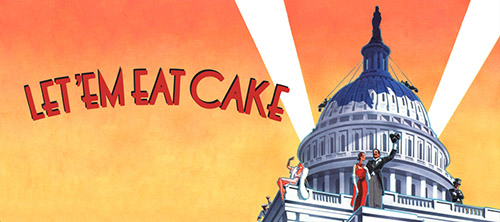
Musical
Musique: George Gershwin • Paroles: Ira Gershwin • Livret: George S. Kaufman • Morrie Ryskind • Production originale: 1 version mentionnée
Dispo: Résumé Génèse Liste chansons
Genèse: The original Broadway production of Let 'Em Eat Cake opened October 21, 1933 at the Imperial Theatre, New York City, USA and ran for 89 performances. It had The cast included William Gaxton as J.P. Wintergreen, Victor Moore as Alexander Throttlebottom, Philip Loeb as Kruger, and Lois Moran as Mary Wintergreen. The no longer extant orchestrations were by Edward B. Powell. The show carried a message that audiences did not want to hear and it was a failure. However, it did have one song: "Mine". Several musical themes from Of Thee I Sing are reused in Let 'Em Eat Cake, including the Supreme Court Judges' song and the campaign song "Wintergreen for President", which includes parts of folk and patriotic songs such as Sousa's "Stars and Stripes Forever", and "Hail, Hail, the Gang's All Here." A concert version of the show was performed on BBC Radio in 1994 (with a cast that included: Denis Quilley, Kim Criswell, Joss Ackland, Henry Goodman, and Louise Gold), and Opera North staged the show, along with a revival of Of Thee I Sing, during its 2008–9 season. The Opera North production was broadcast by BBC Radio 3 on Saturday, 26 September 2009, as part of its Opera on 3 series.
Résumé:
Acte I
President Wintergreen is up for reelection, but due to the continuing Great Depression, loses in a landslide to John P. Tweedledee. Wintergreen makes an unsuccessful appeal to the Supreme Court to overturn the election results. It is also revealed that Diana Deveraux divorced Throttlebottom to marry the French Ambassador. After the end of his term, Wintergreen, Throttlebottom, and their associates start a business selling his wife Mary's blue shirts on "Union Square." At Union Square, Kruger, an agitator, is proclaiming his doctrine "Down with Everything That's Up." After talking with Kruger, Wintergreen decides that to increase shirt sales they should promise a revolution or their money back, citing the European Brown Shirts and Black Shirts. With business now booming ("Shirts by Millions"), Mary appeals to the women to join the New Blue D.A.R. ("Climb up the Social Ladder") to increase female shirt sales. Wintergreen now needs the support of the Union League Club, because General Snookfield is a member. Throttlebottom persuades them by saying that the British are attacking Bunker Hill ("Comes the Revolution Reprise"). Having secured the Union League Club support, The Blue Shirts meet with Snookfield to plan the overthrow of the government ("On and On and On"). At nine o'clock on July 4, when the Blue Shirts arrive, Snookfield will give the signal for his soldiers to seize Tweedledee. On the Fourth, at the White House grounds, Tweedledee is giving a speech, when Snookfield leaves with Trixie for a party. The Blue Shirts arrive only to find the general is missing and the soldiers don't know what to do. Tweedledee promises the army a "dollar a day which (he) may not pay." Wintergreen promises the army the war debts owed by the League of Nations, which the soldiers accept. Tweedledee is deposed, and Wintergreen declares that "the land of freedom is free once more" ("Let 'Em Eat Cake").Acte II
The White House is being painted "Blue, Blue, Blue." The Supreme Court, now in chains, are brought before Wintergreen. He decides to show leniency because the Court officiated his marriage ceremony. The Court is reorganized into a baseball team. When the League of Nations arrives to discuss repayment of the war debts, they "No Comprenez, No Capish, No Versteh" when the issue is raised; only Finland repays their debt. Kruger, now head of the army following Snookfield's disgrace, is also putting pressure on Wintergreen to remember his promise. Wintergreen offers a solution where the debts will be settled by a baseball game for double or nothing. If the League loses, they will have another conference to discuss it. Kruger accepts the League's offer of Finland's money as a side bet. Throttlebottom hesitatingly accepts an offer to be the game's umpire. On the date of the ballgame the Supreme Ball Players, the League, and Kruger's army try to influence Throttlebottom to bend the rules their way. The United States loses the game after a controversial call by umpire Throttlebottom. The soldiers want someone to be held to account for the loss, over Wintergreen and his associates' objections ("Oyez, Oyez, Oyez"). In the "Trial of Throttlebottom" a military tribunal is underway. Kruger, the Army, and the Ball Players call for Throttlebottom's execution claiming he conspired with the enemy. Wintergreen and his associates object, until the army levels the guns at them. Kruger and the army want to know when they are going be paid ("A Hell of a Hole"). After Wintergreen offers them a share of the shirt business, the army is going to take it all (Down With Everything That's Up—Reprise). Despite pleading he tried his best to get the money ("It Isn't What You Did"), Kruger sentences Wintergreen and his cronies to death by beheading. Mary and the condemned's wives enter and proclaim they are pregnant. Kruger says this may have worked four years ago during Wintergreen's impeachment hearings, but it doesn't work with the army. Trixie, who controls the Navy, arrives and joins forces with Kruger ("First Lady and First Gent"). Kruger proclaims "Let 'em Eat Caviar." Execution day arrives, and in their jail cell Wintergreen, Throttlebotton, and the Committee discuss how they ended up in this situation. Next, the crowds gather to watch the executions ("Hanging Throttlebottom in the Morning"). A guillotine bought from France is unveiled, and Snookfield is shown to be the executioner. Since Throttlebottom is not married, he will be executed first. After a series of mishaps with the guillotine, Mary interrupts the proceedings. She presents a "Fashion Show" with dresses that arrived on the boat that brought the guillotine. After being reminded that the color of the revolution is blue, and they cannot wear the new fashions, the women revolt. Kruger objects, but the soldiers seize him after Trixie reminds them of an upcoming party. Wintergreen tells the soldiers to shoot Kruger. When Kruger reveals he used to be in the dress making business, Wintergreen decides to go into business with him. Wintergreen decides to leave the revolution business and restores the republic and the Supreme Court. Tweedledee shows up and Wintergreen gives his vice-president, Throttlebottom, to him, since he can't remember his. Tweedledee declines the Presidency, since he is going to be President of Cuba. Throttlebottom is now the President. After Wintergreen promised the people cake and Kruger promised them caviar, Throttlebottom promises them pistache ice cream, which he formerly detested.Création: 21/10/1933 - Imperial Theatre (Broadway) - 90 représ.
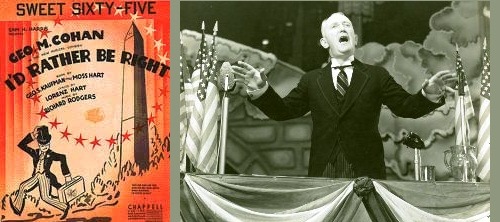
Musical
Musique: Richard Rodgers • Paroles: Lorenz M. Hart • Livret: George S. Kaufman • Moss Hart • Production originale: Sam H. Harris • 1 version mentionnée
Dispo: Résumé Liste chansons
Après le flop en février 1937 de "Fulton of Oak Falls", qui avait marqué après près de 20 ans, la réconciliation de de Cohan et Harris, Cohan a décidé de partir tenter sa chance à Londres… C'est à ce moment que Cohan a reçu un appel de Sam Harris pour rester à New York. Sam avait un rôle pour lui dans sa nouvelle production qu’aucun autre acteur ne pouvait faire. Le rôle était celui de Franklin Delano Roosevelt, et la pièce était "I'd Rather Be Right". Avec le succès de "I’d Rather Be Right" Cohan s’est retrouvé propulsé à nouveau comme roi de Broadway, lefaisant participer à de nombreuses réunions sociales et dîners mondains.
Genèse:
Résumé: Le spectacle se déroule à Central Park à New York, le 4 juillet, le jour de la fête nationale américaine. Peggy et Phil espèrent se marier mais le patron de Phil ne lui donnera pas d’augmentation jusqu’à ce que Roosevelt équilibre le budget. Phil s’endort et rêve qu’ils rencontrent Roosevelt flânant dans le parc. Après que Phil explique le dilemme du couple, Roosevelt promet de l’aider - ce qui n’est qu’une excuse pour quelques blagues se moquant des membres du Cabinet, de la Cour suprême, de la PWA, des conversations au coin du feu, d’Alf Landon, des conférences de presse et de la décision du Président de se présenter pour un troisième mandat.
Création: 2/11/1937 - Neil Simon Theatre (Broadway) - 290 représ.
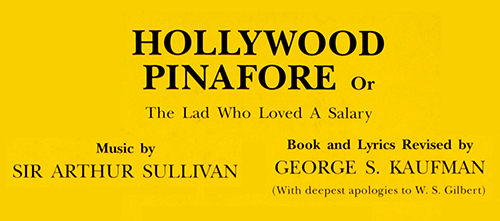
Musical
Musique: Arthur Sullivan • Paroles: George S. Kaufman • Livret: George S. Kaufman • Production originale: 1 version mentionnée
Dispo: Résumé Génèse Isnpiration Liste chansons
George S. Kaufman’s adaptation of Gilbert and Sullivan’s H.M.S. Pinafore into a satiric look at the Hollywood studio system seemed like a sure thing.
Genèse: It opened on Broadway at the Alvin Theatre on May 31, 1945, and closed on July 14, 1945 after 52 performances. According to Howard Teichmann's 1972 biography George S. Kaufman: An Intimate Portrait, Kaufman had the inspiration for Hollywood Pinafore during a poker game with his friend Charles Lederer. While Lederer was arranging his cards, he idly sang a few bars of "When I Was a Lad" from Pinafore while ad-libbing a new lyric: "Oh, he nodded his head / and he never said 'no' / and now he's the head of the studio." Kaufman insisted on paying Lederer a token fee for the idea of transplanting Pinafore's setting to a Hollywood studio.
Résumé: Starlet Brenda Blossom, pining for a lowly writer, Ralph, is promised in marriage by her father (a director looking to advance his own career) to the studio head, Joseph Porter. If she marries Ralph, she'll be tossed out of Hollywood and forced to make a living on the stage. Everything turns out for the best when it is discovered that a mix-up in Louhedda Hopsons' gossip column was responsible for Ralph's fall from grace. In reality, it was Ralph who was meant to head the studio instead of Porter.
Création: 31/5/1945 - Neil Simon Theatre (Broadway) - 53 représ.

Musical
Musique: Cole Porter • Paroles: Cole Porter • Livret: Abe Burrows • George S. Kaufman • Laureen MacGrath • Production originale: 2 versions mentionnées
Dispo: Résumé Liste chansons
Silk Stockings est un musical avec un livret de George S. Kaufman, Leueen MacGrath et Abe Burrows et une musique et des paroles de Cole Porter. Le musical est vaguement basé sur l'histoire de Melchior Lengyel, Ninotchka, et l'adaptation cinématographique qu'elle a inspirée en 1939. Il a été diffusé à Broadway en 1955. Ce fut le dernier comédie musical que Porter a écrit pour la scène.
Genèse:
Résumé: Silk Stockings se déroule principalement à Paris, la ville de comédie musicale préférée de Cole Porter. Trois agents russes, Ivanov, Brankov et Bibinski sont envoyés là-bas pour récupérer le plus grand compositeur russe Peter Ilyich Boroff des voies détournées du capitalisme, mais bientôt les agents eux-mêmes sont enchantés par le mode de vie de l’Occident décadent. Quand Ninotchka reçoit l’ordre de Moscou de les ramener tous au pays, elle tombe elle aussi sous le charme de Paris et des bas de soie, et se retrouve amoureuse de l’agent de cinéma américain Steve Canfield, qui veut utiliser la musique de Boroff dans un futur film mettant en vedette Janice Dayton ancienne reine des films de "belles en maillot de abin" aux États-Unis qui veut maintenant passer à des films dramatiqueq avec une version musicale de Guerre et Paix. Inutile de dire que tout finit bien et que les agents russes ainsi que Boroff et Ninotchka se retrouvent du côté ouest du rideau de fer.
Création: 24/2/1955 - Imperial Theatre (Broadway) - 478 représ.
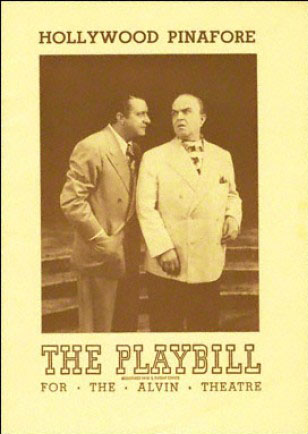
Version 1
Hollywood Pinafore (1945-05-Alvin Theatre-Broadway)
Type de série: OriginalThéâtre: Neil Simon Theatre (Broadway - Etats-Unis) Durée : 1 mois 2 semaines Nombre : 53 représentationsPremière Preview : Thursday 31 May 1945Première : Thursday 31 May 1945Dernière : Saturday 14 July 1945Mise en scène : George S. Kaufman • Chorégraphie : Producteur : Avec : Victor Moore (Joseph W. Porter), George Rasely (Mike Corcoran),Gilbert Russell (Ralph Rackstraw), William Gaxton (Dick Live-Eye), Annamary Dickey (Brenda Blossom), Shirley Booth (Louhedda Hopsons), Russ Brown (Bob Beckett), Mary Wickes (Miss Hebe), Diana Corday (Miss Gloria Mundi), Pamela Randell (Miss Beverly Wilshire), Ella Mayer (Little Miss Peggy), Dan De Paolo (Doorman), Jackson Jordan (Secretary), Eleanor Prentiss (Secretary), Drucilla Strain (Secretary), Ernest Taylor (Guard); The Lyn Murray Singers: Sally Billings, Florence George, Jane Hansen, Lucy Hillary, Josephine Lambert, Margaret Mc-Kenna, Candace Montgomery, Jeanne North, Annette Sorell, Mary Williams, Dean Campbell, Harold Cole, Jack Collins, Charles Dubin, Silas Engum, Howard Hoffmann, Barry Kent, James Mate, John Mathews, Larry Stuart, Jeffrey Warren; Dancers: Eleanor Boleyn, Helene Constantine, Barbara (Babs) Heath, Virginia Meyer, Ann Newland, Mary Alice Bingham, John Butler, Ronny Chetwood, Stanley Herbert, Shaun O’Brien, Jack Purcell, Regis Powers
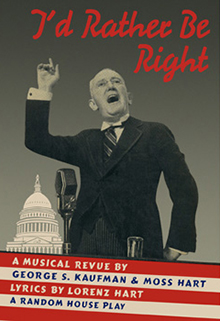
Version 2
I'd rather be right (1937-11-Alvin Theatre-Broadway)
Type de série: OriginalThéâtre: Neil Simon Theatre (Broadway - Etats-Unis) Durée : 8 mois 1 semaine Nombre : 290 représentationsPremière Preview : Tuesday 02 November 1937Première : Tuesday 02 November 1937Dernière : Saturday 09 July 1938Mise en scène : George S. Kaufman • Chorégraphie : Producteur : Sam H. Harris • Avec : Joseph Allen (A Butler), David Allman (The Secretary of the Navy), Florenz Ames (James B. Maxwell), Al Atkins (The Secretary of Commerce), Jack BarnesVirginia Berger (Singing Girl), Sol Black (Acrobat), Robert Bleck (The Secretary of Agriculture), Jeanette Bradley (The Nurse), Charles Bywater (Singing Boy), Cecil Carey (Singing Girl), Don Carter (A Seal), John Cherry (The Chief Justice), Ruth Clayton (Singing Girl), George M. Cohan (The President of the United States), Marie Louise Dana (The President's Mother), Eleanor De Witt (Dancing Girl), Martin Fair (Clown), Bijou Fernandez (The Secretary of Labor), Len Frank (Singing Boy), Kate Fredric (Dancing Girl), John Fulco (Singing Boy), Ralph Glover (President's Secretary), Ruth Gormley (Dancing Girl), Joseph Granville (Another Mother), Marion Green (The Secretary of State), Geraldine Hamilton (Singing Girl), Edward Harrington (Best Man), Joy Hodges (Peggy Jones), Taylor Holmes (The Secretary of the Treasury), Robert Howard (Dancing Boy), Jay Hunter (Dancing Boy), Jack Kearney (Singing Boy), Linda Kellogg (Singing Girl), Georgette Lampsi (Dancing Girl), Jeanette Lee (Dancing Girl), Jack Leslie (Singing Boy), Robert Less (The Attorney-General), Velma Lord (Dancing Girl), Joseph Macaulay (Federal Theatre Director), Lili Mann (The Teacher), William Marel (Singing Boy), Austin Marshall (Phil Barker), Irene McBride (The Mother), Charles McLoughlin (The Secretary of the Interior), John McQuade (Singing Boy), Evelyn Mills (Sistie), Jack Mills (The Secretary of War), Warren Mills (Buzzie), Marie Nash (Singing Girl), Fred Nay (The Father), Austra Neiman (Bareback Rider), Paul Parks (The Postmaster General), Erminie Randolph (Singing Girl), Jack Reynolds (Acrobat), Jane Richardson (Singing Girl), Tina Rigat (Another Mother), Margaret Sande (The Girl), Patsy Schenk (Dancing Girl), Betty Schlaffer (Dancing Girl), Clarise Sitomer (A Flower Girl), Bob Spencer (Singing Boy), Emily Stephenson (Singing Girl), Georgie Tapps (Social Service Messenger), Beau Tilden (Dancing Boy), Norman Van Emburgh (Singing Boy), Joe Verdi (Joe), Dorothy Waller (Dancing Girl), Mary Jane Walsh (Singing Girl), Jack Whitney (A Photographer), Herbert Wood (Singing Boy)Commentaires : Alvin Theatre: 2 nov 1937 - may 1938
Music Box Theatre: 23 mai 1938 - 9 juil 1938Presse : "Mr. Roosevelt should feel very happy about his part in "I'd Rather Be
Right." On the whole, George S. Kaufman and Moss Hart feel very
tender about him. Apart from their affectionate treatment of him in the
plot and lines of their musical comedy they have engaged George M.
Cohan to impersonate the President, which is a dispensation devoutly
to be desired by anyone who wants to please an audience...Mr. Cohan
has never been in better form. The audience was his, and lovingly his,
all last evening.
If the authors had held council with Jim Farley, they could hardly have
felt in better humor about our country. Although advance reports seemed
to indicate that "I'd Rather Be Right" might discharge a lampoon at the
follies of current politics, it turns out to be a pleasant-spoken musical
comedy that leisurely ambles away the evening. There is some brisk
stuff here and there - a capital object lesson in the effects of taxation,
which is worthy of the Living Newspaper technique; a quip or two about
the Federal Theater, "Wherever we see three people together we are
supposed to give a show"; a poke at Walter Lippmann and a few
frolicsome skirmishes with the Supreme Court. But there have been
Marx Brothers shows in the past that were more hilariously antic than
this pastoral in Central Park, and "Of Thee I Sing" was enormously
more versatile and dynamic. "I'd Rather Be Right" is playful; and,
all questions of political opinion to one side, that is hardly enough for
a first-rate musical show." (Brooks Atkinson, New York Times)
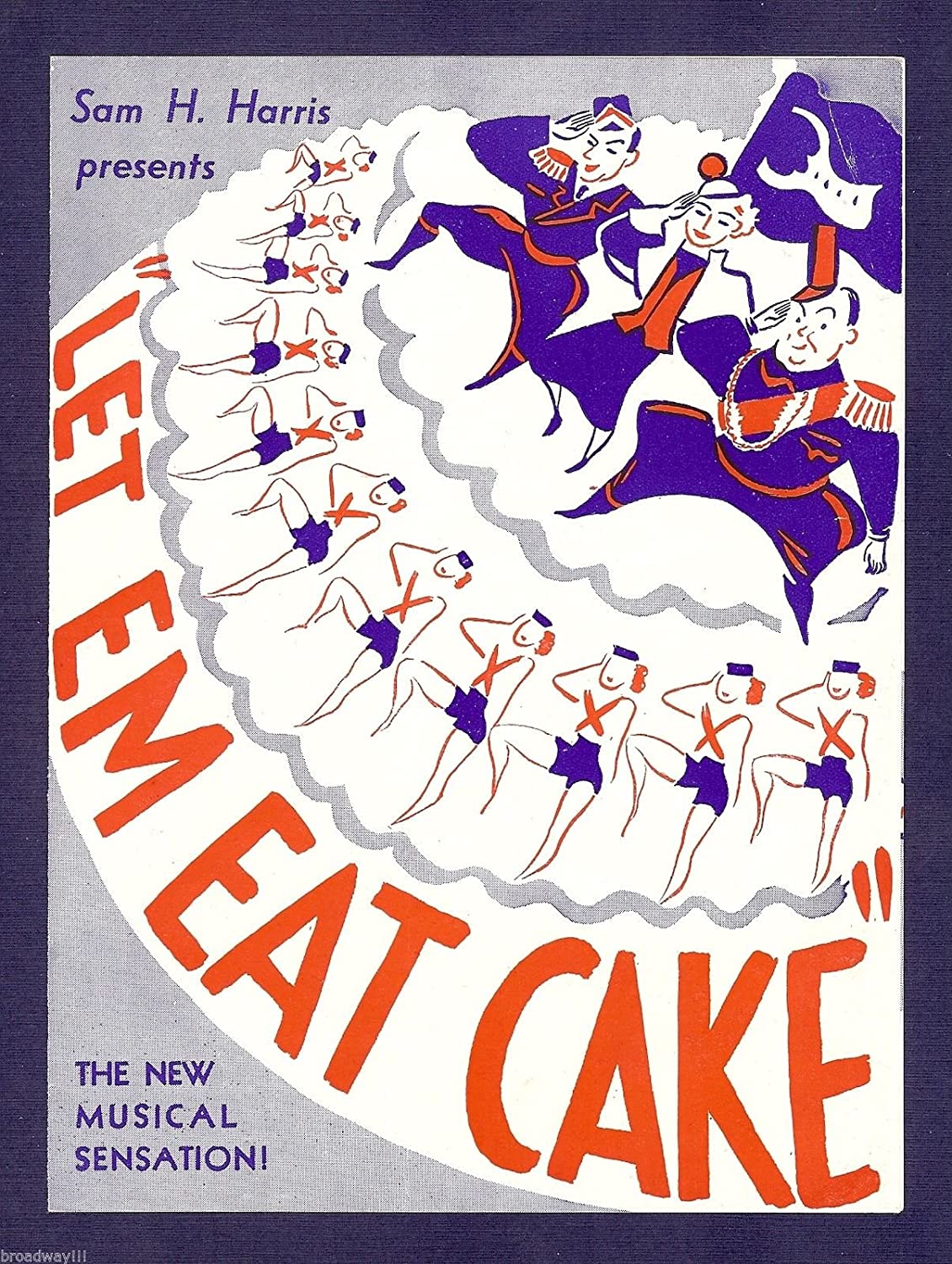
Version 3
Let 'Em Eat Cake (1933-10-Imperial Theatre-Broadway)
Type de série: OriginalThéâtre: Imperial Theatre (Broadway - Etats-Unis) Durée : 2 mois 2 semaines Nombre : 90 représentationsPremière Preview : Saturday 21 October 1933Première : Saturday 21 October 1933Dernière : Saturday 06 January 1934Mise en scène : George S. Kaufman • Chorégraphie : Producteur : Avec : Kay Adams (Lady's Ensemble), Ruth Adams (Lady's Ensemble), Florenz Ames (Gen. Adam Snookfield, U.S.A.), Kathleen Ayres (Lady's Ensemble), Peggy BancroftBruce Barclay (Prison Guard), Vivian Barry (Mrs. Jones), Paul Brachard (Men's Ensemble), Alice Burrage (Mrs. Gilhooley), Robert Burton (Dignitary), Gordon Clark (Men's Ensemble), Ray Clarke (Men's Ensemble), Dudley Clements (Matthew Arnold Fulton), Charles Conklin (Secretary), Tom Curley (Men's Ensemble), Nonie Dale (Lady's Ensemble), Gail Darling (Lady's Ensemble), Bryan Davis (Men's Ensemble), Alyce Downey (Lady's Ensemble), Leon Dunar (Passerby), Enes Early (Lady's Ensemble), Vance Elliott (Prison Guard), Louise Estes (Lady's Ensemble), Charles Flower (Men's Ensemble), Consuelo Flowerton (Mrs. Lyons), Michael Forbes (Passerby), Olgene Foster (Lady's Ensemble), Charles Fowler (Snodgrass), Frank Gagen (Men's Ensemble), William Gaxton (John P. Wintergreen), Dorothy Graves (Lady's Ensemble), Yvonne Gray (Lady's Ensemble), Peggy Green (Lady's Ensemble), David Gross (Men's Ensemble), Ethel Hampton (Lady's Ensemble), Evelyn Hannons (Nurse), Tom Harris (Men's Ensemble), Pat Hastings (Customer), Don Hudson (Policeman), Viola Hunter (Lady's Ensemble), Amalie Ideal (Lady's Ensemble), Phil King (Men's Ensemble), George Kirk (Lieutenant), Terry Lawlor (Customer), David Lawrence (A. Flunkey), Kay Lazell (Lady's Ensemble), Al LeFebevre (Men's Ensemble), Betty Lee (Lady's Ensemble), Martin Leroy (Dignitary), Robert Lewis (Dignitary), Philip Loeb (Kruger), Ed Loud (Men's Ensemble), George E. Mack (Senator Robert E. Lyons), Mary Jo Matthews (Mrs. Fulton), Harold Moffet (Francis X. Gilhooley), Victor Moore (Alexander Throttlebottom), Lois Moran (Mary Wintergreen), Fred Nay (Men's Ensemble), Richard Neely (Men's Ensemble), Hazzard Newberry (Pete), Ruth Porter (Lady's Ensemble), Victor Pullman (Men's Ensemble), Abe Reynolds (Louis Lippman), Ralph Riggs (Chief Justice of the Supreme Court), W. Francis Robertson (Uncle William), Edward H. Robins (Senator Carver Jones), Martin Sheppard (Men's Ensemble), Grenna Sloane (Mrs. Lippman), Steward Steppler (Men's Ensemble), Harold Sternberg (Men's Ensemble), Baun Sturtz (Lady's Ensemble), Richard Temple (John P. Tweedledee), Morris Tepper (Russian), Martha Tibbetts (Lady's Ensemble), Norman Van Emburgh (Men's Ensemble), John Walsh (Men's Ensemble), Elinor Witte (Lady's Ensemble), Wanda Wood (Lady's Ensemble), Grace Worth (Trixie Flynn), Jessica Worth (Lady's Ensemble)
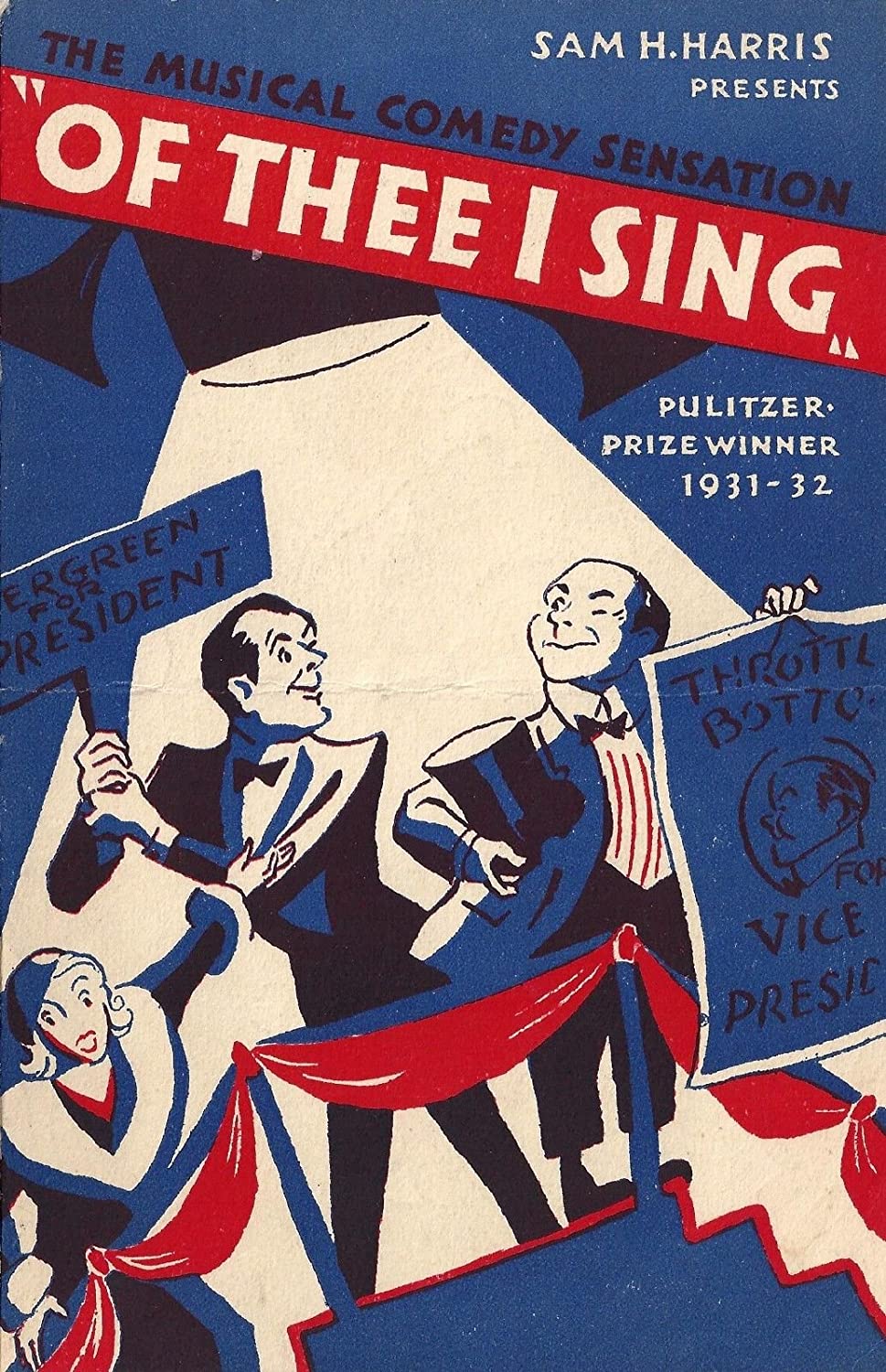
Version 4
Of thee I sing (1931-12-Music Box Theatre-Broadway)
Type de série: OriginalThéâtre: Music Box Theatre (Broadway - Etats-Unis) Durée : 1 an 2 semaines Nombre : 441 représentationsPremière Preview : Saturday 26 December 1931Première : Saturday 26 December 1931Dernière : Saturday 14 January 1933Mise en scène : George S. Kaufman • Chorégraphie : Producteur : Avec : Ruth Adams (Ensemble), Dave Allman (The Jack Linton Band), Florenz Ames (The French Ambassador), Kathleen Ayres (Ensemble), Bruce BarclayVivian Barry (Chambermaid), Charles Bennett (The Jack Linton Band), Leslie Bingham (Nora), Grace Brinkley (Diana Devereaux), Bobbie Brodsley (Ensemble), Robert Burton (Ensemble), Martha Carroll (Ensemble), Mary Carroll (Ensemble), Ray Clarke (Ensemble), Dudley Clements (Matthew Arnold Fulton), Charles Conklin (Ensemble), Tom Curley (Ensemble), Dorothy Donnelly (Ensemble), Tom Draak (Vladimir Vidovitch), Leon Dunar (Ensemble), Ann Ecklund (Ensemble), Frank Erickson (Ensemble), Jack Fago (Ensemble), Michael Forbes (Ensemble), Olgene Foster (Ensemble), Virginia Franck (Ensemble), Frank Gagen (Ensemble), William Gaxton (John P. Wintergreen), Dorothy Graves (Ensemble), Yvonne Gray (Ensemble), Peggy Greene (Ensemble), Sulo Hevonpaa (Yusef Yussevitch), Walter Hinger (The Jack Linton Band), Milton Hollander (The Jack Linton Band), Georgette Lampsi (Ensemble), Terry Lawlor (Ensemble), David Lawrence (Ensemble), Martin Le Roy (Chief Senate Clerk), Jack Linton (The Jack Linton Band), Lillian Lorray (Ensemble), George E. Mack (Senator Robert E. Lyons), Martha Maggard (Ensemble), Sam Mann (Louis Lippman), Mary Mascher (Ensemble), John McCahill (Ensemble), Charles McClelland (Ensemble), Jake Vander Meulen (The Jack Linton Band), Frank Miller (The Jack Linton Band), Harold Moffet (Francis X. Gilhooley), Victor Moore (Alexander Throttlebottom), Lois Moran (Mary Turner), George Murphy (Sam Jenkins), Richard Neely (Ensemble), Hazzard Newberry (Ensemble), June O'Dea (Emily Benson), Anita Pam (Ensemble), Jack Ray (Ensemble), Ralph Riggs (The Chief Justice), Edward H. Robins (Senator Carver Jones), Billie Seward (Ensemble), Pete Shance (The Jack Linton Band), Grenna Sloane (Ensemble), Adele Smith (Ensemble), Barbara Smith (Ensemble), Baun Sturtz (Ensemble), Peggy Thomas (Ensemble), Patricia Whitney (Ensemble), Jessica Worth (Ensemble)Commentaires : Music Box Theatre (Dec 26, 1931 - Oct 1933)
46th Street Theatre (Oct 10, 1932 - Jan 14, 1933)

Version 5
Of thee I sing (1933-05-Imperial Theatre-Broadway)
Type de série: RepriseThéâtre: Imperial Theatre (Broadway - Etats-Unis) Durée : 3 semaines Nombre : 32 représentationsPremière Preview : Monday 15 May 1933Première : Monday 15 May 1933Dernière : Saturday 10 June 1933Mise en scène : George S. Kaufman • Chorégraphie : Producteur : Avec : Ruth Adams (Ensemble), Dave Allman (The Jack Linton Band), Florenz Ames (The French Ambassador), Kathleen Ayres (Ensemble), Bruce BarclayVivian Barry (Chambermaid), Charles Bennett (The Jack Linton Band), Leslie Bingham (Nora), Grace Brinkley (Diana Devereaux), Bobbie Brodsley (Ensemble), Robert Burton (Ensemble), Martha Carroll (Ensemble), Mary Carroll (Ensemble), Ray Clarke (Ensemble), Dudley Clements (Matthew Arnold Fulton), Charles Conklin (Ensemble), Tom Curley (Ensemble), Dorothy Donnelly (Ensemble), Tom Draak (Vladimir Vidovitch), Leon Dunar (Ensemble), Ann Ecklund (Ensemble), Frank Erickson (Ensemble), Jack Fago (Ensemble), Michael Forbes (Ensemble), Olgene Foster (Ensemble), Virginia Franck (Ensemble), Frank Gagen (Ensemble), William Gaxton (John P. Wintergreen), Dorothy Graves (Ensemble), Yvonne Gray (Ensemble), Peggy Greene (Ensemble), Sulo Hevonpaa (Yusef Yussevitch), Walter Hinger (The Jack Linton Band), Milton Hollander (The Jack Linton Band), Georgette Lampsi (Ensemble), Terry Lawlor (Ensemble), David Lawrence (Ensemble), Martin Le Roy (Chief Senate Clerk), Jack Linton (The Jack Linton Band), Lillian Lorray (Ensemble), George E. Mack (Senator Robert E. Lyons), Martha Maggard (Ensemble), Sam Mann (Louis Lippman), Mary Mascher (Ensemble), John McCahill (Ensemble), Charles McClelland (Ensemble), Jake Vander Meulen (The Jack Linton Band), Frank Miller (The Jack Linton Band), Harold Moffet (Francis X. Gilhooley), Victor Moore (Alexander Throttlebottom), Lois Moran (Mary Turner), George Murphy (Sam Jenkins), Richard Neely (Ensemble), Hazzard Newberry (Ensemble), June O'Dea (Emily Benson), Anita Pam (Ensemble), Jack Ray (Ensemble), Ralph Riggs (The Chief Justice), Edward H. Robins (Senator Carver Jones), Billie Seward (Ensemble), Pete Shance (The Jack Linton Band), Grenna Sloane (Ensemble), Adele Smith (Ensemble), Barbara Smith (Ensemble), Baun Sturtz (Ensemble), Peggy Thomas (Ensemble), Patricia Whitney (Ensemble), Jessica Worth (Ensemble)
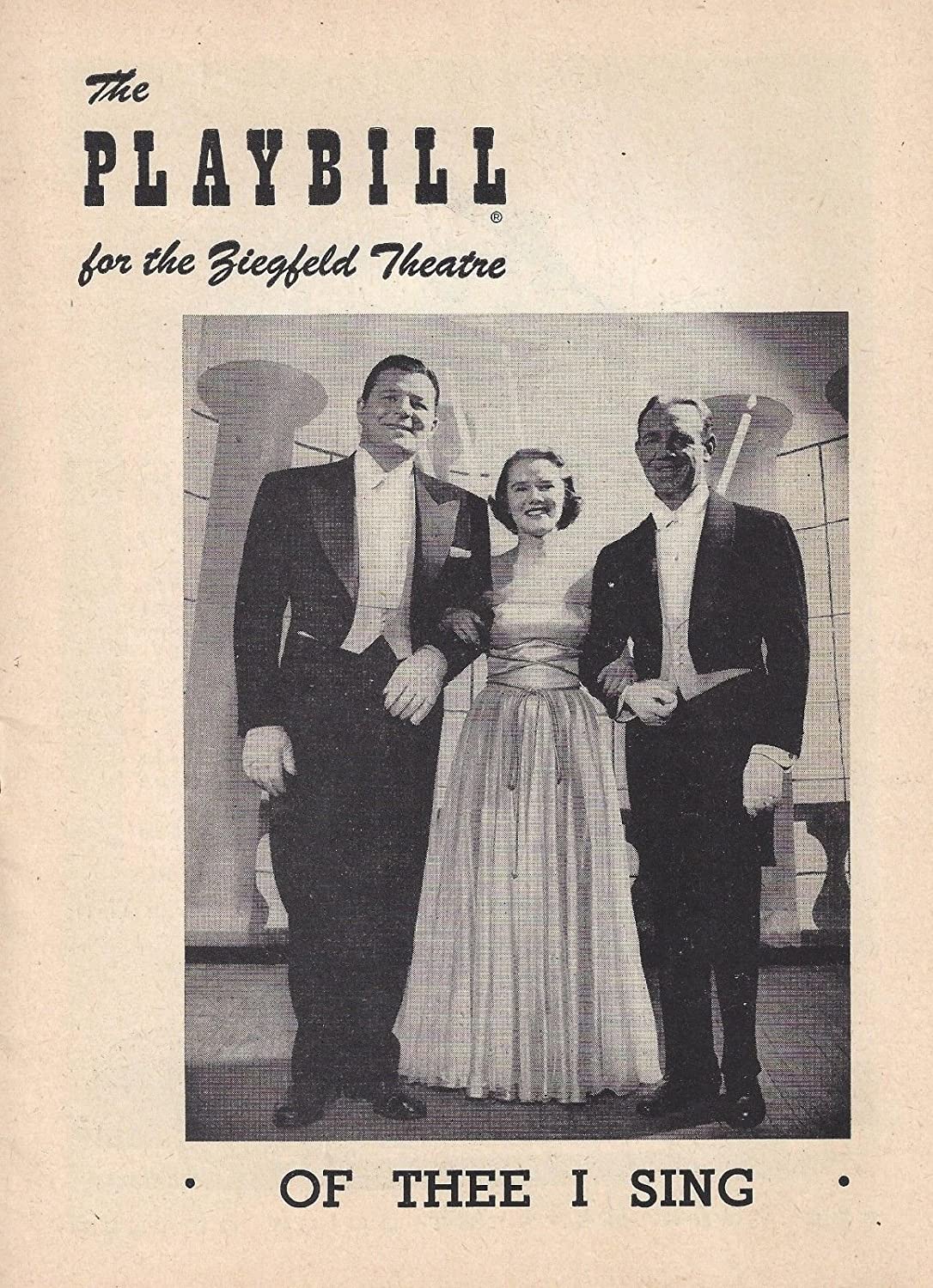
Version 6
Of thee I sing (1952-05-Ziegfield Theatre-Broadway)
Type de série: RevivalThéâtre: Ziegfield Theatre (Broadway - Etats-Unis) Durée : 1 mois Nombre : 72 représentationsPremière Preview : Monday 05 May 1952Première : Monday 05 May 1952Dernière : Thursday 05 June 1952Mise en scène : George S. Kaufman • Chorégraphie : Producteur : Avec : Jack Carson (John P. Wintergreen), Paul Hartman (Alexander Throttlebottom), Florenz Ames (The French Ambassador), Arlene Anderson (Showgirl), Ken AyersVicki Barrett (Dancer), Jean Bartel (Beauty Contestant), Betty Buday (Dancer), Claudia Campbell (Singer), Louise Carlyle (Chambermaid), Norman Clayton (Singer), Georgine Darcy (Dancer), Crandall Diehl (Dancer), Gregg Evans (Showgirl), Charlotte Foley (Showgirl), Donald Foster (Senator Robert E. Lyons), Howard Freeman (Senator Carver Jones), Warren Galjour (Singer), J. Corkey Geil (Dancer), Skeet Guenther (Dancer), Jay Harwick (Singer), Keith Kaldenberg (Singer), Joe Kerrigan (Singer), Michael King (Flunkie), William Krach (Flunkie), Lenore Lonergan (Diana Devereaux), Jonathan Lucas (Sam Jenkins), Joan Mann (Emily Benson), Mort Marshall (Announcer), James McCracken (Singer), Al McGranary (Chief Flunkey), Peggy Merber (Dancer), Betty Oakes (Mary Turner), J. Pat O'Malley (Francis X. Gilhooley), Bob Oran (Yusef Yussevitch), Helen Rice (Singer), Dorothy Richards (Showgirl), Jeanne Schlegel (Singer), Frank Seabolt (Dancer), Robert F. Simon (Louis Lippman), Siri (Showgirl), Loring Smith (Matthew Arnold Fulton), Joanne Spiller (Singer), Pat Stanley (Dancer), Abe Stein (Vladimir Vidovitch), Bob Tucker (Dancer), Jeanne Tyler (Showgirl), Gloria Van Dorpe (Singer), Charlotte Van Lein (Showgirl), Larry Weber (Singer), Tom Wells (Attaché), Jack Whiting (The Chief Justice), Parker Wilson (A Sightseer)